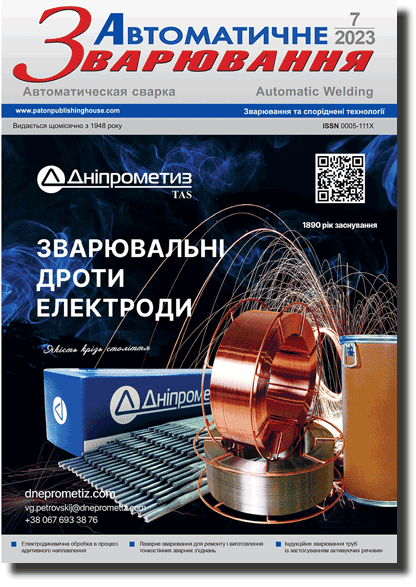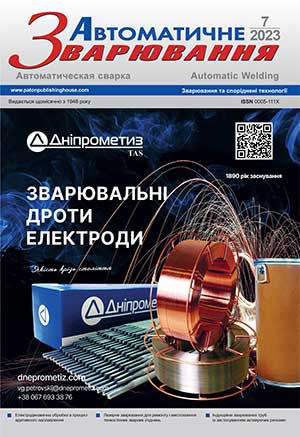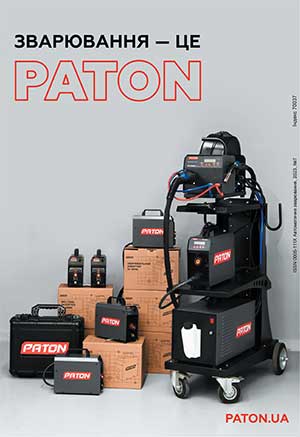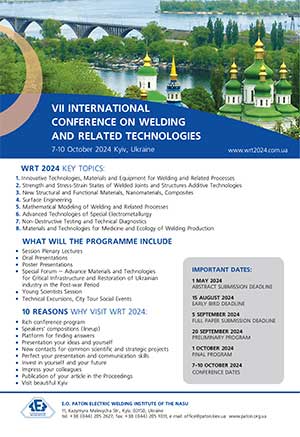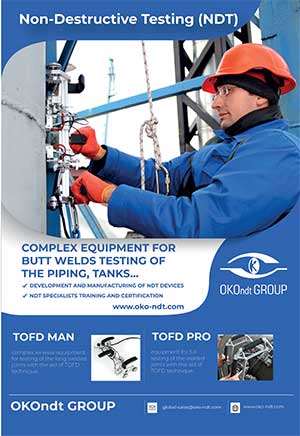| 2023 №07 (02) |
DOI of Article 10.37434/as2023.07.03 |
2023 №07 (04) |
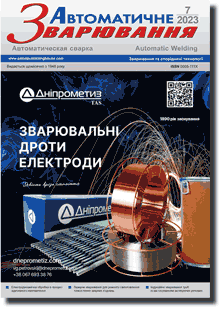
"Avtomatychne Zvaryuvannya" (Automatic Welding), #7, 2023, pp. 25-30
Use of laser welding and surfacing technologies for repair and manufacture of thin-walled welded joints of high-alloy steels
A.V. Bernatsky, O.V. Siora, V.I. Bondareva, N.O. Shamsutdinova, Yu.V. Yurchenko
E.O. Paton Electric Welding Institute of the NAS of Ukraine. 11 Kazymyr Malevych Str., 03150, Kyiv, Ukraine. E-mail: office@paton.kiev.uaThin-walled welded joints of corrosion-resistant high-alloy steels are used in various industries for the manufacture of critical structures. The tendency to reduction in the mass of products in order to save costs and energy resources makes it relevant to find the ways to solve the problem of welding such joints, including also the use of concentrated power sources such as laser radiation. The use of laser technologies in welding thin-walled joints of high-alloy steels may be applied not only at the manufacturing stage but also at the stage of repair. The high cost of treatment of such materials makes the problem of finding the ways to avoid the formation of defects in such welded joints relevant. At the same time, it is urgent to develop technologies for repair of thin-walled welded joints made of high-alloy steels. The article is devoted to the solution of this task namely by using laser welding and surfacing technologies. According to the results of visual, radiographic testing and metallographic examinations, the parameters of thin-walled welded T-joints of AISI 321 steel were evaluated, namely: geometry, ripple, presence of craters, pores, their quantity, sizes, mutual position and other parameters provided by ISO 13919-1:2015 standard. The analysis of the obtained data made it possible to find the presence of individual defects of welded T-joints in the form of single pores, chain of pores, lacks of fusion, lowering of the weld, lacks of penetration, shrinkage cavities and cavities in the crater, undercuts, excess of convexity. The procedure for their elimination and prevention of their formation was developed. It was established that thin-walled welded T-joints of AISI 321 steel after repair according to the proposed procedure have mechanical characteristics at the level of defectfree welded joints and amount to 670…717 MPa. This allows recommending the proposed procedure to perform the operation of repair of such joints when eliminating defects in the form of burn-outs. 12 Ref., 2 Tabl., 11 Fig.
Keywords: laser welding, high-alloy steels, welded T- joints, repair, procedures of defects elimination, critical structures
Received: 21.06.2023
References
1. Soltani, H. M., Tayebi, M. (2018) Comparative study of AISI 304L to AISI 316L stainless steels joints by TIG and Nd: YAG laser welding. Journal of Alloys and Compounds, 767, 112-121. https://doi.org/10.1016/j.jallcom.2018.06.3022. Ramakrishna R, V.S.M., Amrutha, P.H.S.L.R., Rahman Rashid, R.A., Palanisamy, S. (2020) Narrow gap laser welding (NGLW) of structural steels - a technological review and future research recommendations. The International Journal of Advanced Manufacturing Technology, 111, 2277-2300. https://doi.org/10.1007/s00170-020-06230-9
3. Khokhlov, M., Bernatskyi, A., Berdnikova, O. et al. (2022) Optimization of T-Joints laser robotic welding procedure parameters from AISI 321 stainless steel. In: Arsenyeva, O., Romanova, T., Sukhonos, M., Tsegelnyk, Y. (Eds.) Smart Technologies in Urban Engineering: Proceedings of STUE-2022 (pp. 513-524). Cham: Springer International Publishing. https://doi.org/10.1007/978-3-031-20141-7_47
4. Khaskin, V.Yu., Korzhyk, V.M., Dong, C., Illyashenko, E.V. (2020) Improvement of the effectiveness of laser welding processes by reciprocating movement of the focus. The Paton Welding J., 1, 54-60. https://doi.org/10.37434/tpwj2020.01.08
5. Bernatskyi, A., Sydorets, V., Berdnikova, O. et al. (2021) Research of technology for repair of heat exchangers of nuclear power plants by laser welding. Solid State Phenomena, 313, 94-105. https://doi.org/10.4028/www.scientific.net/SSP.313.94
6. Bernatskyi, A., Goncharov, P., Sokolovskyi, M. et al. (2023) Spot welded joints of steels produced by electric arc and laser welding in different spatial positions. In: H. Altenbach, et al. (Eds.) Advances in Mechanical and Power Engineering. CAMPE 2021. Lecture Notes in Mechanical Engineering (pp. 198-207). Cham: Springer International Publishing. https://doi.org/10.1007/978-3-031-18487-1_20
7. Krivtsun, I.V., Korzhik, V.N., Khaskin, V.Y. et al. (2019) Hybrid laser-microplasma welding of stainless steels. The Paton Welding J., 12, 31-36. https://doi.org/10.15407/tpwj2019.12.04
8. Wang, L., Gao, X., Kong, F. (2022) Keyhole dynamic status and spatter behavior during welding of stainless steel with adjustable-ring mode laser beam. Journal of Manufacturing Processes, 74, 201-219. https://doi.org/10.1016/j.jmapro.2021.12.011
9. Das Banik, S., Kumar, S., Singh, P. K., Bhattacharya, S. (2023). Influence of weld repair on the residual stresses induced in austenitic stainless steel weld joints. Production Engineering, 17(1), 81-94. https://doi.org/10.1007/s11740-022-01156-5
10. Chen, Z., Sun, W., Huang, Y. et al. (2022) The effect of laser energy density on microstructural evolution and mechanical properties of laser clad 316L stainless steel for repair. Surface and Coatings Technology, 448, 128899. https://doi.org/10.1016/j.surfcoat.2022.128899
11. Zhu, J., Li, L., Li, D. et al. (2022) Microstructural evolution and mechanical properties of laser repaired 12Cr12Mo stainless steel. Materials Science and Engineering: A, 830, 142292. https://doi.org/10.1016/j.msea.2021.142292
12. Sheikhbahaee, H., Mirahmadi, S.J., Pakmanesh, M.R., Asghari, S. (2022) Investigating sensitivity to process parameters in pulsed laser micro-welding of stainless steel foils. Optics & Laser Technology, 148, 107737. https://doi.org/10.1016/j.optlastec.2021.107737
Advertising in this issue:
The cost of subscription/purchase order journals or individual articles
| Journal/Currency | Annual Set | 1 issue printed |
1 issue |
one article |
| TPWJ/USD | 384 $ | 32 $ | 26 $ | 13 $ |
| TPWJ/EUR | 348 € | 29 € | 24 € | 12 € |
| TPWJ/UAH | 7200 UAH | 600 UAH | 600 UAH | 280 UAH |
| AS/UAH | 1800 UAH | 300 UAH | 300 UAH | 150 UAH |
| AS/USD | 192 $ | 32 $ | 26 $ | 13 $ |
| AS/EUR | 180 € | 30 € | 25 € | 12 € |
| SEM/UAH | 1200 UAH | 300 UAH | 300 UAH | 150 UAH |
| SEM/USD | 128 $ | 32 $ | 26 $ | 13 $ |
| SEM/EUR | 120 € | 30 € | 25 € | 12 € |
| TDNK/UAH | 1200 UAH | 300 UAH | 300 UAH | 150 UAH |
| TDNK/USD | 128 $ | 32 $ | 26 $ | 13 $ |
| TDNK/EUR | 120 € | 30 € | 25 € | 15 € |
AS = «Automatic Welding» - 6 issues per year;
TPWJ = «PATON WELDING JOURNAL» - 12 issues per year;
SEM = «Electrometallurgy Today» - 4 issues per year;
TDNK = «Technical Diagnostics and Non-Destructive Testing» - 4 issues per year.




